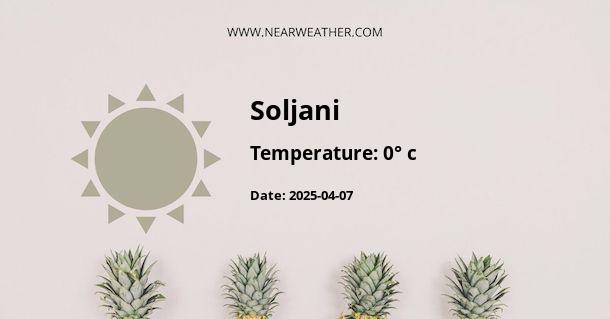Understanding the Climate and Weather of Soljani, Croatia
In the heartland of the agriculturally rich Slavonia region lies the small village of Soljani in Croatia. Renowned for its beautiful landscapes and fertile soils, the weather in Soljani deeply influences the local ecosystem, agricultural activities, and the overall way of life. It is important to explore the climatic nuances to appreciate and anticipate the environmental conditions thoroughly.
Geographical Context of Soljani
Soljani is situated in the Vukovar-Srijem County of eastern Croatia, close to the border with Bosnia and Herzegovina. This geographical positioning affects its climate, exposing it to continental influences that shape the weather patterns significantly.
Climatic Overview
The village experiences a humid continental climate, characterized by four distinct seasons: a warm summer, a mild spring, a colorful autumn, and a typically cold winter. Dinaric Alps to the southwest and the Pannonian Plain stretching out to the northeast further modulate the local climate. Data from the Croatian Meteorological and Hydrological Service and the Köppen climate classification corroborate this assessment.
Seasonal Weather Patterns
Let’s break down the climatic conditions by season to understand what one can expect throughout the year in Soljani:
- Spring (March - May): This season witnesses a gradual warming trend. Early spring can still be quite chilly, especially at night, with temperatures averaging between 5°C to 15°C. In late spring, temperatures can rise comfortably to 20°C. Precipitation is moderate, and flora begins its bloom, dotting the landscape with vibrant colors.
- Summer (June - August): Summers are typically warm and occasionally hot, with average daytime highs reaching 25°C to 30°C. However, these temperatures can sometimes soar to around 35°C during heatwaves. Rainfall is less frequent but might be heavy during thunderstorms, especially in the earlier part of the season.
- Autumn (September - November): The air cools down rapidly, and temperatures start to drop, averaging between 10°C to 20°C. This is the season of harvest, and the landscape turns into a palette of golden, orange, and brown hues. Rains become more regular, contributing to the wetness of the soil, important for sowing winter crops.
- Winter (December - February): Winters are cold with average temperatures hovering around freezing, particularly at night. Snow is a common occurrence and varies from year to year. Foggy conditions are not unusual due to temperature inversions, which can last for several days.
Temperature and Precipitation Table
| Month | Average High (°C) | Average Low (°C) | Precipitation (mm) |
|---|---|---|---|
| January | 3 | -3 | 40 |
| February | 6 | -2 | 35 |
| March | 10 | 1 | 45 |
| April | 16 | 6 | 50 |
| May | 21 | 11 | 55 |
| June | 24 | 14 | 75 |
| July | 27 | 16 | 65 |
| August | 27 | 16 | 60 |
| September | 22 | 12 | 55 |
| October | 16 | 7 | 55 |
| November | 10 | 3 | 60 |
| December | 5 | -1 | 45 |
Note: The above weather statistics are average estimates that can vary from year to year.
Extreme Weather Events
Like many European regions, Soljani is not immune to extreme weather phenomena. In recent years, with the apparent effects of climate change taking hold, fluctuations in weather patterns have become more pronounced. It’s not uncommon for Soljani to experience occasional summer droughts, as well as intense storms that may lead to localized flooding.
Climate Change Impact
Research indicates the potential for increased frequency and intensity of heatwaves and heavy precipitation events due to global climate change. Longer-term predictions suggest a gradual rise in the overall temperatures and a possible shift in precipitation patterns which could impact agriculture — a vital sector in Soljani.
Agricultural Implications
The local economy of Soljani is deeply intertwined with its climate, particularly through agriculture. Weather conditions, therefore, have a direct impact on crop yields, viticulture, and livestock-farming activities. Farmers must stay abreast of the latest meteorological data and adapt their practices to cope with the changing patterns.
Conclusion
In conclusion, understanding the comprehensive climatic framework and weather tendencies of Soljani aids stakeholders in making informed decisions, whether for agriculture, tourism, or daily life. With an eye on climatological shifts, Soljani's inhabitants and authorities can plan for a future underpinned by resilience and adaptability. Recognizing the weather's cyclic characteristics ensures that both the beauty of Soljani's changing seasons, and the community’s well-being, can be preserved.
A - Soljani's Latitude is 44.950279 & Longitude is 18.970280.
A - Weather in Soljani is 13° today.
A - Climate Conditions in Soljani shows overcast clouds today.
A - Humidity in Soljani is 73% today.
A - Wind speed in Soljani is 3.28 km/h, flowing at 42° wind direction. today.
